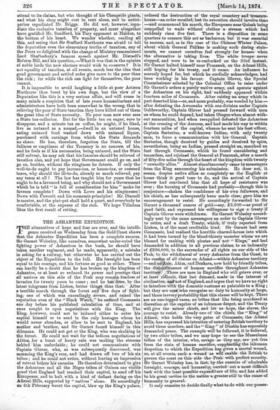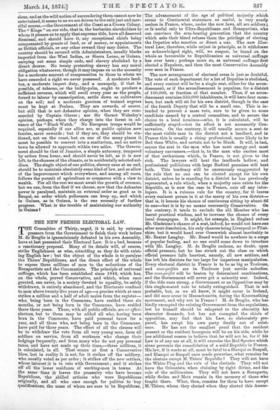THE ASHANTEE EXPEDITION.
THE alternatives of hope and fear are over, and the intelli- gence received on Wednesday from the Gold Coast shows that the Ashantee Expedition has been a complete success. Sir Garnet Wolseley, like ourselves, somewhat under-rated the fighting power of Ashantees in the bush, he should have taken another regiment, and he made, apparently, a mistake in asking for a railway, but otherwise he has carried out the object of the Expedition to the full. His foresight has been equal to his courage, and his fortune as good as either. There can hardly be a doubt that he has broken up the kingdom of Ashantee, or at least so reduced its power and prestige that all natives on this side of the Prah may remain fearless of invasion for twenty years to come ; and he has 'done, by the latest telegrams from Lisbon, better things than that. After a terrible march through the forest and five days of fight- ing, one of which was exceedingly severe, and raised the reputation even of the "Black Watch," he entered Coomassie one day before his published calculation of time, and at once sought to open negotiations with the King. The King, however, could not be induced either to enter his capital himself or to send in the only hostages whom he would never abandon, or allow to be sent to England, his mother and brother, and Sir Garnet found himself in this dilemma. He could not get at the King, who was skulking in the forest. He could not wait for the tedious negotiations of Africa, for a burst of heavy rain was making the streams behind him unfordable ; he could not communicate with Captain Glover, who, as was subsequently discovered, was menacing the King's rear, and had drawn off two of his six tribes ; and he could not retire, without leaving an impression of retreat betsre his enemies. He therefore determined to give the Ashantees and all the Negro tribes of Guinea one visible proof that England had reached their capital, to send off his Europeans, and to halt with a kind of defiant daring on the Adansi Hills, supported by " natives " alone. He accordingly en 6th FObruary burnt the capital, blew up the King's palace, ordered the destruction of the royal cemetery and treasure- house—an order recalled, lest its execution should involve time —and commenced his march, the Europeans near Quisah being compelled to wade without clothes a stream which had suddenly risen five feet. There is a disposition in. some quarters to censure this act as barbarous, but it was essential to success, and, as in the ease of the Chinese Winter Palace, about which General Palikao is making such daring state- ments, we cannot ourselves feel strongly for houses when the alternative is taking lives. The white troops never stopped, and were to be re-embarked on the 23rd instant. Sir Garnet halted himself near Femanah, on the Adansi Hills, still hoping for his treaty, and it came. An influence he scarcely hoped for, but which he cordially acknowledges, had been working in his favour. Captain Glover, the Special Commissioner selected by the Colonial Office to raise under Sir Garnet's orders a purely native army, and operate against the Ashantees on his right, had suddenly appeared within fourteen miles of Coomassie. After raising an army which in part deserted him—or, and more probably, was weeded by him— after defeating the Awoonahs with one division under Captain Goldsworthy, Captain Glover had pressed forward with men on whom he could depend, had taken Obogoo when almost with- out ammunition, had when resupplied defeated the Ashantees at the crossing of the Asnoom, and had made his way to within fourteen miles of the capital, whence he sent his best officer, Captain Sartorius, a well-known Indian, with only twenty men, to force a communication with his General. Gaptain Sartorios, though deceived by guides and deceived by spies, nevertheless, being an Indian, pressed straight on, marched on foot through Coomassie, which he found smouldering and tenantless, and rejoined the General at Fomanah, after a march of fifty-five miles through the heart of the kingdom with twenty "cowardly allies." Almost simultaneously came in messengers from the King announcing his submission. He does not, it seems, despise native allies as completely as the English at home think it good tone to do, and the arrival of Captain Glover had convinced him that all hope of resistance was over ; the burning of Coomassie had probably—though this is conjecture—shaken the confidence of his own followers, and his chiefs, as has subsequently been made clear, gave him no encouragement to resist. He accordingly forwarded to Sir Garnet a thousand ounces of gold—say, £3,500—as proof of good faith, and expressed his willingness to sign a treaty if Captain Glover were withdrawn. Sir Garnet Wolseley accord- ingly sent by the same messengers an order to Captain Glover to retire, and a draft Treaty, which, if truly reported from Lisbon, is of the most creditable kind. Sir Garnet had seen Goomassie, had realised the horrible charnel-house into which it had been turned by the blood-thirsty monster whom we are blamed for ranking with pirates and not "Kings," and had demanded in addition to all previous claims, to an indemnity of £200,000, to the surrender of all rights on our side of the Prah, to the withdrawal of every Ashantee from the Coast, to the cession of all claims on Adansi—within Ashantee territory —and orrAsin, Akim, and Denkara, now held by friendly tribes, the disOntinuance of human sacrifice throughout Ashantee territory:-, There are men in England who will grieve over, or at least ridicule, that last demand, made in the interest of civilisation, aotrnot of England, and argue that we have no right to interfere With the domestic customs so palatable to a King ; but they are mot who recognise no duty to humanity at large, and there is every probability that this clause will be kept. There are no one-legged races, no tribes that like being murdered at discretion at the caprice of an inhuman despot, and the Treaty will give the minor chiefs, and let us hope, the slaves, the courage to resist. Already 'one of the chiefs, the "King" of Adansi, who holds the very gates of Coomassie, the Adansi Hills, has expressed his intention of entering British territory to avoid these murders, and the "King" of Duabin has separately demanded peace. The example will be followed, it is believed, by two other tribes, and we may hope to see the Massulman tribes of the interior, who, savage as they are, are yet free from the stain of human sacrifice, supplanting the inhuman despotism to which the Expedition hap given a mortal wound, or, at all events, Bach a wound as will enable the British to govern the coast on this side the Prah with perfect security. Sir Garnet Wolseley has, in fact, by the exercise of admirable foresight, courage, and humanity, carried out a most difficult task with the least possible expenditure of life, and has added to his great service to the nation a greater still to the cause of humanity in general. It only remains to decide finally what to-do with our posses- sions, and as the wild notion of surrendering them cannot now be entertained, it seems to us we are driven to the only just and mer- ciful course,—the Government of the Coast as a Crown Colony. The "Kings" on our side, that is, the barbarian slaveholders to whom it pleases us to apply that supreme title, have all deserved dismissal, and should have it, any exceptional chiefs being compensated by grants of land, or of money, or appointments as British officials, or any other reward they may desire. The country should be covered with Administrators, usually blacks imported from the West Indies, or Sierra Leone, or Guiana, carrying out some simple code, and slavery abolished by a direct decree. No treaty protecting slavery has any moral obligation whatsoever, though it may impose on us the necessity for a moderate amount of compensation to those to whom we have conceded a right we never possessed. A moderate land- tax, a moderate import duty, and a monopoly, if that be possible, of tobacco, or the toddy-palm, ought to produce a sufficient revenue, which will swell every year as the people, forced to labour by emancipation, settle down as cultivators on the soil; and a moderate garrison of trained negroes must be kept at Prahsu. They are cowards, of course, but still that is not Ashantee opinion, when they are com- manded by Captain Glover ; nor Sir Garnet Wolseley's opinion, perhaps, when they charge into the forest in ad- vance of the "Black Watch." No European troops would be required, especially if our allies are, as public opinion now fancies, mere cowards ; but if they are, they should be sta- tioned, not on the coast, but on one of the many places it must be possible to convert into a sanitarium, and no native town be allowed to approach within two miles. The Govern- ment should be that of Jamaica, a simple autocracy, tempered by orders from home, and should never be left, as it is now left, to the chances of the climate, or to accidentally selected sol- diers. The single object of our politics, slavery once at an end, should be to maintain absolutely some kind of law, and so allow of the improvement which everywhere, and among all races, follows the pursuit of agriculture or commerce with a view to wealth. For all the rest we must await the growth of revenue, but we can, from the first if we choose, now that the Ash antee power is paralysed, maintain an external order as good as in Bengal, an order which policemen can keep up, and which in Guinea, as in Guiana, is the one necessity of further progress. What is the trouble of maintaining our authority in Guiana?

































 Previous page
Previous page